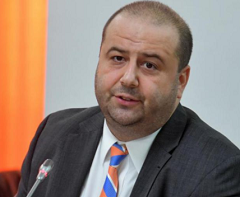 The Senate, under its role as the decision-making chamber, in this case, will discuss in plenary amendments to Law 94/1992 on the functioning and organization of the Court of Auditors.
The Senate, under its role as the decision-making chamber, in this case, will discuss in plenary amendments to Law 94/1992 on the functioning and organization of the Court of Auditors.
If senators keep the amendments approved by deputies, Romania risks the freezing of all payments for European financed projects in the current budget exercise.
In the European Commission’s view, some of the amendments approved in the lower chamber do not meet international standards and affect the institution’s independence.
In the initiators’ view, however, changes were made precisely to align the law with the international auditing standards. The correlation with the international regulations is the pretext invoked in the Explanatory Memorandum of this legislative intervention and of other bills harshly criticized by the European institutions. For example, the case of the „reform” of the laws on the judiciary.
Interventions on Law 94/1992 undoubtedly have the potential to severely affect the independence of the Court of Auditors in several ways:
- extend the functions of the president (appointed by a political decision, by the Parliament) to the detriment of the collective management, through the Court’s plenary
- allow the interference of other institutions in the Court ‘s activity
- create loopholes for heads of public institutions who have illegally spent public money
For Romania, the stake of these amendments means over EUR 20 billion. For PSD and ALDE, the authors of the dangerous amendments, the stake is the political control of the Court of Auditors, so that local elected representatives and heads of institutions cannot be accountable for the unlawful or unnecessary spending of public (national and European) funds.
The draft amendment to Law 94/1992 on the Court of Auditors received a final vote in the Chamber of Deputies on 25 April and received all the opinions of the Senate committees involved in the proceeding.
Decision concentrated to only one hand: extending the role of the president, to the detriment of the Court of Auditors’ Plenary
The proposed amendments effectively annul the Court of Auditors’ collective management and the most important tasks are transferred from the plenary comprising 18 independent accountants to the president of the institution (a political figure appointed by the Parliament).
 At this moment, the president is Mihai Busuioc (photo), a social-democrat loyal to Liviu Dragnea. Former Secretary-General of the Government, after PSD-ALDE came into power, he was the main pawn used by Liviu Dragnea inside Victoria Palace to prevent Sorin Grindeanu and Victor Ponta from taking over the Executive.
At this moment, the president is Mihai Busuioc (photo), a social-democrat loyal to Liviu Dragnea. Former Secretary-General of the Government, after PSD-ALDE came into power, he was the main pawn used by Liviu Dragnea inside Victoria Palace to prevent Sorin Grindeanu and Victor Ponta from taking over the Executive.
Mihai Busuioc was appointed to the Court of Auditors last year for a nine-year term.
Extended functions to the president:
- „The organizational structure of the General Secretariat and the functions of its departments are established by the Plenary of the Court of Auditors,” the current law provides. The amendment voted by deputies adds that these things will be done following the proposal of the CC president.
- It is the CC’s president who will decide whether he or she notifies prosecutors of the irregularities found. The fate of mayors, heads of institutions, etc. who spent the public money in violation of the law will exclusively depend on the will of a person who is a political appointee. At present, Article 33 says the notification is made by the head of the department who found „the existence of acts on which there are indications they were committed in violation of the law.”
- „The president approves the functions of departments and compartments within the General Secretariat and the President’s apparatus” will be added to Art. 60.
- A new structure is established under the president’s authority – „President’s apparatus” (Article 8). It is a distinct structure from the general secretariat and the president’s office and will check all reports before they are transmitted.
Court of Auditors is no longer the supreme authority to certify data from implementation accounts verified
The draft approved in the Chamber of Deputies abrogated art. 31 of the current law, which now provides:
- The Court of Auditors shall certify the accuracy and veracity of the data in the implementation accounts audited.
- No other authority can issue an opinion on the data registered in the implementation accounts, except on a provisional basis.
This means that the CC is the decisive authority in the matter of discharge – the granting of the compliance certificate to certify the implementation of the accounts in a public authority.
By repealing the article, any entity may decide on the certification of public accounts and the Court of Auditors is obliged to accept the report of the auditor paid by the audited entity.
Measures to protect officials with criminal problems
- It is repealed the CC’s obligation to request „the suspension from office, according to the law, of persons accused of committing acts causing significant damages or serious financial irregularities, ascertained during controls or audits, until the final settlement of the cases in which they are involved” (Article 45).
- 54, which required the suspension of Court of Auditors members and external public auditors who are taken to court. The draft adopted by deputies provides for the suspension from office only when a conviction has been decided in a first instance.
Public Procurement Agency controls itself and findings become mandatory for Court of Auditors
According to an approved amendment, the Court of Auditors will be obliged to acknowledge all the findings made by the National Public Procurement Agency, a politically controlled institution under the Government’s authority. „Opinions expressed by the National Public Procurement Agency at the request of the Court of Auditors or when issuing their own control documents are mandatory„, states an amendment to Article 29 of the current law.
Similarly, it is stated that the Audit Authority (from the Court of Auditors: checks how European funds are spent by institutions, public administrations, etc.).
Enforcing compliance with the findings of the Public Procurement Agency (ANAP) is bizarre, as there is a similar precedent that led to the suspension of payments for European projects in 2011.
The funds were then blocked precisely because of the ANAP’s involvement (more exactly, its predecessor, the National Authority for Regulating and Monitoring Public Procurement) in the management authorities’ activity, because the ANRMAP’s opinion was taken into consideration when the acquisitions were verified.
European Commission threatens to freeze European funds if Court of Auditors’ independence is affected
The European Commission sent the presidents of the two parliamentary chambers – Liviu Dragnea and Calin Popescu Tariceanu – a letter warning them that Romania risks the suspension of all payments on the European projects if the Court of Auditors is no longer independent.
In these letters, the European Commission asks the Parliament to cancel the proposed amendments to Law 94/1992, as they would endanger the independence of the Audit Authority, informs G4Media.ro
Official warning letters were signed by representatives from three DGs: DG Regio, DG Competition and DG Mare (maritime affairs and fisheries).









